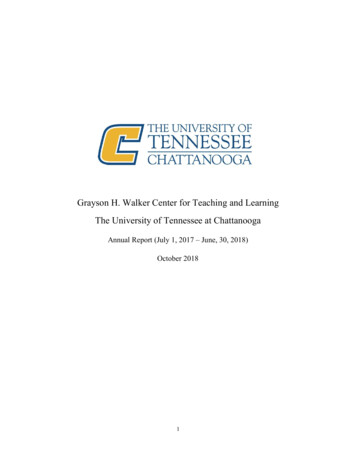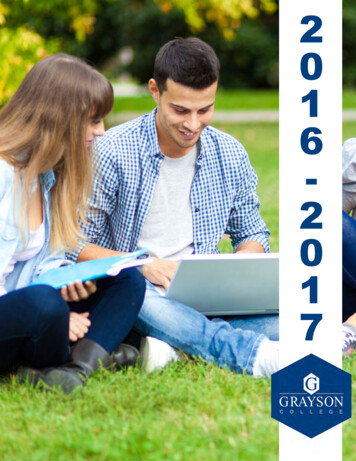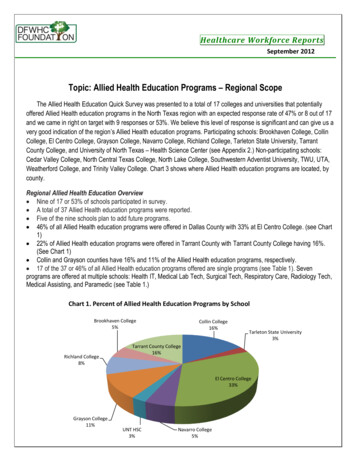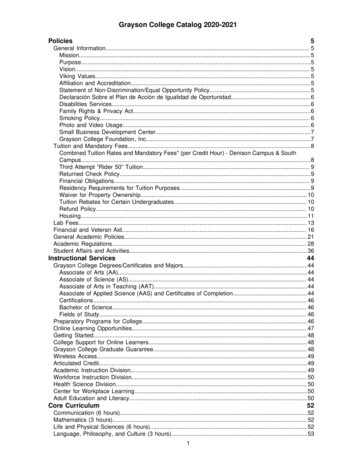
Transcription
Grayson H. Walker Center for Teaching and LearningThe University of Tennessee at ChattanoogaAnnual Report (July 1, 2017 – June, 30, 2018)October 20181
Table of ContentsExecutive Summary . 4I. Mission and Vision . 4II. History . 6III. Overview of Resources . 6A. Staffing: Full-Time Staff . 6B. Staffing: Part-Time Staff . 7C. Facilities . 8D. Advisory Board . 8E. Websites . 9F. Professional Development . 9IV. Overview of Services and Programs . 10A. Orientations . 10B. Faculty Support and Training . 11D. Learning Management System (LMS) . 13E. Quality Course Design and Curriculum Design Support . 14F. Learning Technology Support . 17G. Accessibility . 18H. Experiential Learning (ThinkAchieve) . 19I. High Impact Practices Grants . 23J. Syllabus Template and Syllabus Archiving . 25K. Critical Thinking Assessment Test Scoring . 25L. Faculty Senate Committee and University Committee Service . 26V. Special Projects . 26A. Teaching and Learning Institute (Pedagogy Course) . 26B. Learning Management System (LMS) Review . 27C. Tennessee Higher Education Commission Grant: Governor’s Online Innovation Initiative . 29D. General Education Refresh . 29VI. Opportunities for Growth for WCTL. 30A. Experiential Learning for Strategic Plan Goal 1A . 30B. Teaching and Learning with Electronic Portfolios. 30C. Faculty Mentoring Program . 31D. Lecture Capture . 32E. General Computer Application Support . 32F. Student LMS Support . 33VII. Questions for Consideration . 33VIII. Reference . 332
IV. Appendixes . 34Appendix A. WCTL Organizational Chart for 2017-18 . 34Appendix B. Blackboard usage data. . 35Appendix C. New Faculty Pedagogy Report. . 363
Executive SummaryThe Grayson H. Walker Center for Teaching and Learning (WCTL) provides faculty support forteaching, learning and academic technology integration through one-on-one consultations,seminars, workshops, classroom observations, committees, and by hosting an annual conference.Located in a collaborative space in the library, WCTL is staffed by eight full-time employees anda team of Faculty Fellows, graduate assistants, and undergraduate student workers. Like many ofour comparable and aspiration peers, we provide both pedagogy and academic technologysupport. In 2017-18, we responded to 2,990 service requests with 96% of survey respondentsindicating they were “very satisfied” with our service. We offered 108 faculty developmentsessions and served 614 unique participants (faculty and staff). The major initiatives for WCTLthis year were continuation of Quality Matters for online and hybrid courses, involvement in theLearning Management System (LMS) review, and piloting a semester-long pedagogy course fornew faculty. Much of our work is aligned with goals of UTC’s Strategic Plan including supportof experiential learning – a high impact practice – and assisting faculty with accessible coursecontent. This year, we funded 15 High Impact Practice (HIP) grants to faculty and supported 25faculty with stipends for course redesign projects. We also administered a pilot of BlackboardAlly that supported the university’s accessibility efforts. We continue to add services andprogramming as needs arise; for example, we piloted student LMS support this year. Ouropportunities for growth are to expand campus-wide experiential learning, lead the processes inidentifying and supporting campus-wide e-portfolio and lecture capture solutions, developmentof a faculty mentoring program, expanding general computer software support, and creation of anew unit for student learning support for the LMS, e-portfolios, and experiential learning.I. Mission and VisionThe mission of the Grayson H. Walker Center for Teaching and Learning at theUniversity of Tennessee at Chattanooga (UTC) is to support UTC's strategic plan and academicinitiatives to facilitate excellence in university instruction by providing assistance, information,learning sessions, and consultations in the areas of teaching, learning and technologyintegration. Our work contributes to these Strategic Plan 2015-2020 goals:Goal 1: Transform lives through meaningful learning experiencesa. All undergraduates will complete an internship, practicum, service project,research project, senior capstone, honors thesis, or international experience(WCTL ThinkAchieve Platform)b. Increase student participation in the Honors College and in Honors CollegePrograms (WCTL collaboration with Honors College on faculty development andcourse design)4
d. Expand, integrate, and assess virtual course delivery methods as part of theoverall education experiences (WCTL management and support of the learningmanagement system (LMS); WCTL course design support)e. Provide exemplary student support services (WCTL student support of theLMS)g. Create an environment that encourages intellectual and cultural engagementthrough the liberal and fine arts (WCTL involvement with and the support of thegeneral education curriculum)Goal 2: Inspire, nurture, and empower scholarship, creativity, discovery, innovation, andentrepreneurial initiativesa. Increase participation by students, faculty, and staff in scholarship and creativeactivities that impact the community through partnerships with business andindustry, government and non-profit agencies (WCTL ThinkAchieve Platform;WCTL High Impact Practices Grants)d. Create, adopt, and incorporate learning technologies into the academicexperience (WCTL support of learning technologies)Goal 4: Embrace diversity and inclusion as a path to excellence and society changeb. Improve the cultural inclusion of an physical and technological access forstudents, faculty and staff with disabilities (WCTL support to create accessibleinstructional content/documents; WCTL management and support of BlackboardAlly)d. Build advisory boards and support groups that reflect a diversity ofoccupations, abilities, and cultures (WCTL Advisory Board).Vision: The WCTL vision is two-fold:1) To be the primary resource for faculty and staff to support teaching, learning, and theintegration of academic technologies at UTC.2) To be a student support resource for teaching and learning.5
II. HistoryDr. Grayson Walker was an educator who cared deeply about the craft of teaching.During his tenure at UTC, he served as the director of the environmental studies program, held aphysics faculty position, served as department head, and later was Dean of the College of Healthand Human Services. By the time he was named Provost, he had received every teaching awardUTC offered and compiled a significant body of published research in physics.With Dr. Walker’s support, the Teacher Resource Center was established in February1996. Just five months later, the campus was saddened by Dr. Walker’s sudden death. He held aB.S. in Physics from the University of North Carolina, Chapel Hill; M.S. in Physics from theUniversity of Illinois and a Ph.D. from the Georgia Institute of Technology. He was a specialistin atmospheric droplet physics. Dr. Walker was also actively involved in Kiwanis Club, theEpilepsy Foundation, and Signal Centers.Known as the “Walker Center” on campus, the focus of the Center historically has beenon four areas: 1) faculty development, 2) media and materials production, 3) software review,evaluation, and implementation, and 4) educational technology grants and research (Adsit,2002). While the official name of the center was changed in 2012 from the Walker TeachingResource Center to the Walker Center for Teaching and Learning (WCTL), the focus on facultydevelopment, instructional media, technology, and software, and provision of grants has notchanged.III. Overview of ResourcesA. Staffing: Full-Time StaffThe WCTL is a division of the Teaching and Learning unit of Academic Affairs and in2017-18 included 8 full-time staff. WCTL is overseen by the Executive Director/AssistantProvost who reports to the Provost. The 2017-18 organizational chart is provided in Appendix A.Like many of UTC’s comparable and aspirational peers, this unit provides both pedagogical andacademic technology support to faculty. To support these efforts, there are three SeniorInstructional Developers, the Learning Management System (LMS) administrator, the Trainingand Technology Coordinator, the Learning Technology Specialist, and the Experiential LearningCoordinator. The Instructional Developers assist faculty with quality course design of all6
modalities. Course design, based on best practices in teaching and learning, includes accessibilityof course materials, Quality Matters alignment (online and hybrid), and classroom instruction.Instructional Developers also offer classroom observation services, which provides feedback tothe instructor.The LMS Administrator manages the LMS which involves application administration,administration of outside integrations, and on-demand data reporting, forensics, and analysis.The Training and Technology Coordinator is the back-up LMS administrator, schedules trainings(workshops, seminars), extracts syllabi from the LMS, maintains the WCTL webpages, andconducts LMS training. The Learning Technology Specialist provides assistance to faculty onremote proctoring solutions, lecture capture (Mediasite/Camtasia), web conferencing (Zoom),video captioning (YouTube) and classroom polling. All of these positions provide support tofaculty on the LMS (UTC Learn) and course design. The Experiential Learning Coordinator(ELC) oversees ThinkAchieve and works with faculty, staff, and students across campus onexperiential learning, including course designations, campus events, and communityengagement. Most WCTL staff also teach classes at UTC as adjunct faculty. The ExecutiveDirector manages day-to-day operations of the WCTL and collaborates with other AcademicAffairs staff, Department Heads, and Deans on campus-wide initiatives. The Executive Directoris also the Assistant Provost of Teaching and Learning.In September 2017, the management of Tutoring and Supplemental Instruction services(Center for College and Student Success [CCSS]) was moved under the Assistant Provost ofTeaching and Learning temporarily. This unit was moved from Academic Affairs to StudentSuccess in July 2018.B. Staffing: Part-Time StaffWCTL shares an Administrative Assistant with the Provost Office. In 2017-18,two part-time Faculty Fellows worked in the Center along with two Graduate Assistants. TheFaculty Fellows are UTC faculty who work half-time in WCTL (they receive a 50% courserelease). Faculty Fellows provide faculty development and course design assistance. GraduateAssistants, once trained, provide LMS assistance to faculty and perform other duties such assurvey development and data analysis. The Experiential Learning Coordinator had two7
undergraduate student workers to assist with ThinkAchieve activities, data collection and dataentry.C. FacilitiesThe WCTL is located on the 4th floor of the library building. There are 10 individualoffices, an open flex space, a small conference room, and a break room. The total square footageof WCTL space is 3,365. The arrangement of offices facing the flex space encouragescollaboration during the workday. We often use reserved library classrooms and meeting roomsin the University Center for seminars and workshops.The open space in WCTL has moveable furniture that allows for one-on-oneconsultations, small group meetings, and large group sessions. In the space, there are four roundtables with chairs that can be moved as needed. Along the periphery of the space, there are tableswith desktop computers (PC and Mac) so that faculty can work in the Center. There is also a cartof laptop computers (PC and Mac) that can be used in the Center or taken to other locations towork with faculty.D. Advisory BoardThe WCTL has an Advisory Board of faculty and staff from across campus. The WCTLAdvisory Board meets at least one time in the fall semester and one time in the spring semester.In 2017-18, there were 10 members on the board, representing all colleges: Natalie Haber, Library Michelle Rigler, Disability Resource Center Christina Estoye, College of Business Graduate Office Chad Harriss, Communications Department (College of Arts and Sciences) Erin Hungenberg, Education (College of Health, Education, and Professional Studies) Nai Lamb, Management (College of Business) Aldo McLean, Engineering Management (College of Engineering and ComputerScience) Barbara Norwood, Nursing (College of Health, Education, and Professional Studies) Greg O'Dea, Honors College8
Christina Policastro, Criminal Justice (College of Arts and Sciences)At Advisory Board meetings, WCTL staff provide updates on services and initiatives andseeks input and feedback from the board members on sessions provided, teaching and learningstrategies, LMS options, the WCTL website, etc.E. WebsitesThere are three WCTL-related websites. The main WCTL website provides informationabout our services, support, initiatives, and staff. There is a link to current WCTL data thatsummarizes our support and training data and there is link for faculty to register for workshopsand seminars. Registration is handled through the Customer Relationship Management (CRM)Hobsons Radius software. Access to the Learning Management System is linked from the UTCLearn webpage. From this page, faculty, staff, and students can log into UTC Learn and alsoaccess resources such as UTC Learn tutorials and the UTC Helpdesk. The ThinkAchievewebpage provides information about the SACS Quality Enhancement Plan (QEP) and the currentBeyond the Classroom experiential learning platform.F. Professional DevelopmentWCTL staff regularly participate in and present at conferences that focus on teaching,learning, and technology integration to ensure we are including the latest evidence-basedstrategies in our offerings and support. Examples from 2017-18 are: AAC&U High Impact Summer Institute Blackboard (Bb) World Coalition of Metropolitan and Urban Universities Lily Conferences: Evidence Based Teaching and Learning Quality Matters Connect Conference Online Learning Consortium (OLC) Accelerate Conference SACS COC Annual Meeting and Summer Institute Teaching Professor Conference9
We are also routinely a part of the Dalton State Teaching and Learning Conference, theSouthern Regional Faculty and Instructional Development Consortium (SRFIDC), Educause,and the POD Network. We receive AAC&U and Magna periodicals. Staff complete training forprofessional development on a regular basis. For example, a Senior Instructional Developercompleted the OLC Instructional Designer Certificate in fall 2017. Also in fall 2017, theExecutive Director completed the Institute on Emerging Leadership in Online Learning Programfrom Penn State and OLC. Trainings related to Quality Matters are described in that section ofthe report.IV. Overview of Services and ProgramsThe WCTL provides a variety of services related to teaching, learning, and academictechnology integration. These services are based on evidence-based best practices in the teachingand learning literature. While the focus of WCTL is on supporting faculty, services are alsoprovided to staff and students. For example, we coordinate ThinkAchieve, UTC’s experientiallearning platform that supports faculty, students and staff.A. OrientationsThe WCTL provides orientations for new faculty and adjunct faculty. For New FacultyOrientation, we collaborate with UTC Human Resources (HR) to provide a program with oneday of HR-related information and one day of Teaching and Learning information. The Teachingand Learning session includes information about course syllabi, UTC Learn (Blackboard), theDisability Resource Center, and other faculty resources. During this session, faculty have theopportunity to network with one another and make connections to over 20 campus units. Thisorientation is held over two days in August before classes begin. In August 2017, we had 54 newfaculty participate in orientation. After orientation, the faculty with teaching appointmentscontinued to be engaged with WCTL through the Teaching and Learning Institute.Adjunct Faculty Orientation is provided to new adjunct faculty at UTC. This orientationis is recommended, but not required. For 2017, we offered three sessions each semester beforeclasses started. These short sessions orient new adjuncts to UTC, provide training on UTC Learn,10
and include information on Banner and FERPA training. There is also a UTC Learn organizationfor adjunct faculty that has resources and information.The Center also participates in Graduate Assistant Orientation by providing informationon UTC Learn and teaching resources.B. Faculty Support and TrainingThe WCTL offers support on classroom instruction, course design, accessibility of coursematerials, UTC Learn, and classroom technology. Faculty may call, email, or come to the Centerfor assistance. WCTL staff also visit faculty offices and departmental meetings to providesupport as requested. Referrals for assistance also come to the Center from the IT SolutionsCenter (Helpdesk) through an online ticketing system. For 2017-18, we had a total of 2,990service encounters. The monthly data are shown in Table 1 and current data are found on ourdata webpage.In February 2018, we began administering surveys to clients to get feedback on oursupport services. Of the 69 surveys received, 96% indicated they were “very satisfied” with theservice/support they received.Table 1. Monthly support 27150596285186264269383249126157195130157The Center offers faculty development sessions which are primarily held in the fall andspring semesters. In 2017-18, 614 unique participants attended 108 WCTL sessions. These11
sessions included book clubs, pedagogy sessions that promote best practices in teaching andlearning, and technology training (UTC Learn, learning technology).We conduct face-to-face training and sessions through Zoom, our web-conferencingsoftware. Examples session topics are: Active Learning Book Clubs (example: Teach Students How to Learn) Experiential Learning and Critical Reflection High Impact Practices Interactive Teaching and Student Engagement Developing Measurable Student Outcomes Quality Matters Team-Based Learning UTC Learn QuickStartWe hold a 2-day conference every spring – the Instructional Excellence Conference –that focuses on teaching and learning best practices. For the conference in 2017, we hosted Dr.Saundra McGuire, author of Teach Students How to Learn, and she provided a workshop on thefirst day of the conference. The second day of the Conference included concurrent hands-onsessions that built upon her presentation themes. We integrated Dr. McGuire’s work into facultydevelopment offerings throughout the academic year preceding her visit. The Teach StudentsHow to Learn book was a reading in the Teaching and Learning Institute for new faculty (falland spring) and we offered several book clubs for faculty/staff; free books were provided.Seventy-three faculty and staff attended Dr. McGuire’s workshop. A summary of theoverwhelmingly positive workshop surveys is shown in Table 2.Table 2. Dr. Saundra McGuire workshop on Teach Students How to Learn, Instructional ExcellenceConference 2018 (May 8th)The workshop encouraged me to considerincorporating metacognitive strategies intomy undergraduate classes this fall.StronglydisagreeThis workshop encouraged me to trysomething new with my 25%75%
I am leaving today with some concrete ideasto try with my students in future classes27%73%C. Small Group Instructional Diagnosis (SGID) and Classroom ObservationSmall group instructional diagnosis (SGID) is a process that elicits consensus from thestudents about how a class is progressing. A WCTL staff member visits a classroom uponrequest from the instructor. The process takes 20-25 minutes as the staff member works withgroups of 3-5 students to discuss questions such as: “What do you like about the course and whatis working well in this class?” and “What would you like changed in the course and whatsuggestions do you have to improve the class?” The small groups of students compile a list oftheir answers to these questions. Then each group contributes their suggestions to build a classlist. Any student may veto any item on the list. The final list of items is discussed with theinstructor in a confidential follow-up meeting.Upon request, a WCTL staff member can attend a class and make observations aboutpresentation style and techniques, interactions with students, student engagement, etc. Feedbackfrom the observation is discussed in a confidential follow-up meeting with the faculty member.D. Learning Management System (LMS)The Center manages Blackboard, UTC’s current LMS (UTC Learn). In Fall 2017, UTCmigrated from Blackboard’s managed hosting platform to their software as a service (SaaS)platform. The primary difference between these options is where the application washosted. With managed hosting, UTC Learn resided in a Blackboard managed datacenter inNorthern Virginia. Blackboard’s SaaS offering is hosted using the Amazon Web Services(AWS) datacenter infrastructure. The process of migrating to Blackboard SaaS required theLMS System Administrator to replicate the configuration of the application to mirror the enduser experience of the existing LMS environment. However, several key backend componentsrequired their operational process to be re-engineered. For example, the Student InformationSystem (SIS) integration, authentication using UTC ITD assets, database reporting and analysis,and Ellucian ELP integration for grade transfer. Administration of UTC’s LMS consists of three(3) primary areas of responsibility.13
Application administration and system stability Administration of outside integrationso Student Information Systemo Authenticationo Textbook Publisher integrations (McGraw-Hill, Pearson, Wiley, Cengage, etc.)o Accessibility compliance applicationo Ellucian ILP integration (grade transfer from Blackboard to Banner)o Instructional technology tools (Respondus, Proctorio, ExamSoft, Tutor.com, etc.) On-demand data-reporting, forensics, and analysisIn 2017, we implemented the Ellucian ILP integration which allows faculty to “push”midterm and final grades posted in UTC Learn to Banner for grade processing. This feature hasbeen a very popular feature for faculty because it saves time and allows students to view gradesin both systems. The usage rates of Blackboard tools for 2017-18 is shown in Table 3. Theseusage rates are for all UTC courses (face-to-face, hybrid, and online). More detailed informationis included in Appendix B.Table 3. Usage Rates of Commonly Used Blackboard Tools in UTC courses.ToolUsage RateAnnouncement49%Assignments31%Discussion Board20%Grade Center52%Test20%E. Quality Course Design and Curriculum Design Support1. Quality MattersUTC adopted Quality Matters (QM) in summer 2015 as a framework for quality coursedesign for online and hybrid courses. In April 2018, a policy was adopted by the academiccolleges that implemented QM requirements campus-wide for faculty development and14
online/hybrid course certification. These two processes are important aspects of the assurance ofalignment and the course design process at UTC.The QM Applying the Quality Matters Rubric (APPQMR) workshop is required of anyfaculty teaching online or hybrid courses. This two-week online workshop is designed to helpfaculty become familiar with the QM rubric and the course review process. In this workshop,faculty learn the underlying principles of the QM Rubric and the critical elements of the QMquality assurance process. Successful completion of this workshop provides a foundation inonline teaching and learning best practices in course design. To date, 319 faculty havecompleted this workshop. At UTC, there are 20 QM Peer Reviewers, 5 Master Reviewers, and 1QM APPQMR Facilitator. All WCTL staff have completed some level of QM training, rangingfrom the APPQMR workshop to the Master Reviewer training.QM course reviews and certifications at UTC can be internal or external. The coursecertification process results in enhanced course design through a peer-review process. Thiscontinuous improvement process culminates in a student-centered course with easy navigation,clear alignment of outcomes with course content, activities, and assessments, accessible coursecontents, and transparency in how students are assessed. According to the policy adopted in2018, all general education courses must be in the process of being certified by December 31st,2018. Remaining undergraduate courses and graduate courses must begin the process by May31st, 2019. Faculty are eligible for a 1,000 stipend for completing the course certificationprocess with QM. The Center offers a 2,000 stipend to faculty members who develop and QMcertify new online/hybrid courses. For groups of faculty working on a course together, eachfaculty member who significantly contributes receives the 2,000.Faculty have seen the benefits of using QM as a framework for not only online andhybrid course, but of their face-to-face courses:“As a result of getting two of my classes certified through the Quality Matters process, Ihave seen my course outcomes improve tremendously. Logistically, QM focuses on developinglearner friendly courses. Students are able to navigate the content more easily than they didprior to my course meeting QM standards. For me, the QM process has helped most withalignment, both in the online classroom and in my face to face classe
Dr. Grayson Walker was an educator who cared deeply about the craft of teaching. During his tenure at UTC, he served as the director of the environmental studies program, held a physics faculty position, served as department head, and later was Dean of the College of Health and Human Services.










